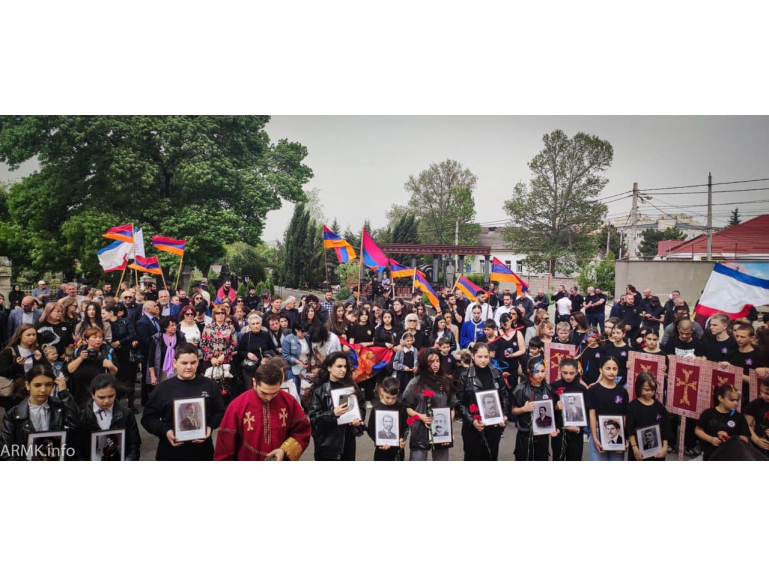Every year, on April 24, recognized by the State Duma of the Russian Federation as the Day of Remembrance of the victims of the genocide, commemoration ceremonies, memorials, and educational events are held in the Russian regions. Armenian Apostolic Church, Armenian national cultural organizations, and communities organize the abovementioned events. Such events find positive feedback from all Russians.
On April 14, 1995, the State Duma of the Federal Assembly of the Russian Federation adopted a statement “Condemning the Genocide of the Armenian people in 1915-1922” on Russia's point of view on the Armenian Genocide. It states that the statement was made based on irrefutable historical facts testifying to the extermination of Armenians on the territory of Western Armenia in 1915-1922. The document recalls that, at the initiative of Russia, the great European powers, back in 1915, qualified the actions of the Ottoman Empire against the Armenian people as a “crime against humanity.” It also noted that the physical destruction of the fraternal Armenian people in their historical homeland was committed in order to create conditions for the destruction of Russia. The State Duma condemned the organizers of the extermination of Armenians, expressed sympathy to the Armenian people, and recognized April 24 as the Day of Remembrance of the Victims of the Genocide.
The Russian President noted that it was Russian diplomacy that achieved international condemnation of violence against the Armenian people. More specifically, it was done at the initiative of Foreign Minister S. D. Sazonov, already in 1915, Russia, France, and the United Kingdom explicitly called the incident in a joint statement a crime against humanity and civilization.
In 2024, events dedicated to the 109th anniversary of the Armenian Genocide were held, including liturgies, laying flowers and wreaths, as well as documentary photo exhibitions. So, on April 24, residents of the city, and representatives of the Armenian Diaspora gathered on the territory of the Church of the Nativity of Nizhnevartovsk (Khanty-Mansi Autonomous Okrug – Ugra), near the sacred Khachkar, to honor the memory of the fallen and innocently killed in the terrible days of the Armenian genocide.
The pain and sorrow of the Armenian people are fully shared by a multinational and multi-religious country, and the memory of the innocently murdered and the dead is carefully preserved both in historical documents and in the hearts of Russians.
On April 14, 1995, the State Duma of the Federal Assembly of the Russian Federation adopted a statement “Condemning the Genocide of the Armenian people in 1915-1922” on Russia's point of view on the Armenian Genocide. It states that the statement was made based on irrefutable historical facts testifying to the extermination of Armenians on the territory of Western Armenia in 1915-1922. The document recalls that, at the initiative of Russia, the great European powers, back in 1915, qualified the actions of the Ottoman Empire against the Armenian people as a “crime against humanity.” It also noted that the physical destruction of the fraternal Armenian people in their historical homeland was committed in order to create conditions for the destruction of Russia. The State Duma condemned the organizers of the extermination of Armenians, expressed sympathy to the Armenian people, and recognized April 24 as the Day of Remembrance of the Victims of the Genocide.
The Russian President noted that it was Russian diplomacy that achieved international condemnation of violence against the Armenian people. More specifically, it was done at the initiative of Foreign Minister S. D. Sazonov, already in 1915, Russia, France, and the United Kingdom explicitly called the incident in a joint statement a crime against humanity and civilization.
In 2024, events dedicated to the 109th anniversary of the Armenian Genocide were held, including liturgies, laying flowers and wreaths, as well as documentary photo exhibitions. So, on April 24, residents of the city, and representatives of the Armenian Diaspora gathered on the territory of the Church of the Nativity of Nizhnevartovsk (Khanty-Mansi Autonomous Okrug – Ugra), near the sacred Khachkar, to honor the memory of the fallen and innocently killed in the terrible days of the Armenian genocide.
The pain and sorrow of the Armenian people are fully shared by a multinational and multi-religious country, and the memory of the innocently murdered and the dead is carefully preserved both in historical documents and in the hearts of Russians.
